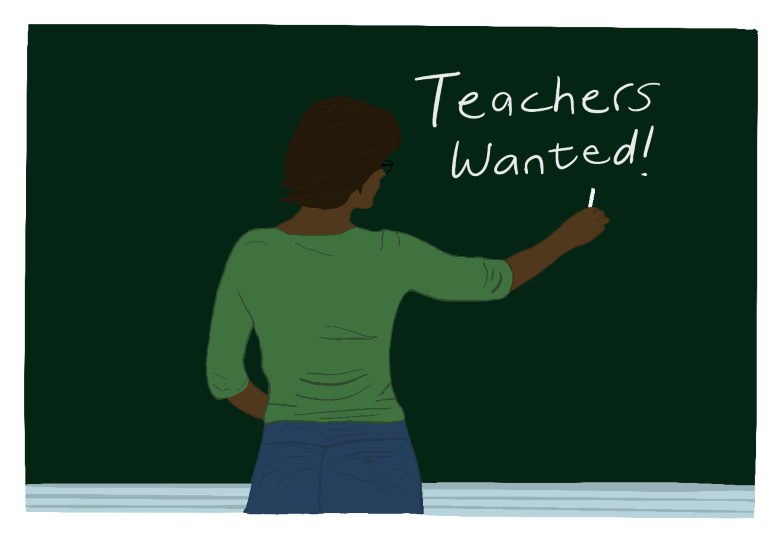Teacher shortages worsen across the nation and in South Dakota
January 18, 2023
Teachers are an essential part of life. They accompany us through our childhood and into our adolescence, seeing us through the good times and bad.
Many of us remember the names of teachers from years ago, the ones who read us story books when we were six or taught us about the phases of the moon when we were eight. From photosynthesis to long division to the most invaluable life lessons, teachers have been there every step of the way imparting their knowledge on every child who enters their classroom. These are the people we trust to educate our children and prepare them for the world. It is in their hands that we place the safety and well being of our children and by extension our future. The role of teachers in our society is not just to grade papers or create worksheets but to shape society in a crucial way.
Though they are essential, shortages of teachers have become a cause for concern. According to the National Education Association there is currently a shortage of about 300,000 teachers and staff nationwide. Due to a general lack of data regarding teacher vacancies, it is difficult to determine the severity of this problem on a national scale; however, rural and low income areas tend to have the worst shortages across the country. According to AP news, the COVID-19 pandemic created the largest drop ever in U.S. school employment during the year 2020. However, data has indicated that teacher shortages are more so a result of difficulty filling vacancies than of educators leaving their jobs; nationwide enrollment in teacher preparation programs has declined by more than a third since 2010 according to the Center for American Progress.
As shortages persist nationwide, South Dakota, where teacher pay is ranked 50th in the nation, is no exception. According to Keloland News, South Dakota’s unprecedented shortage of teachers is partially due to low salaries and large class sizes with more than 500 open teaching positions across the state. Teachers in South Dakota work incredibly hard but, like educators across the nation, are faced with challenges.
“I think sometimes people have misconceptions of what teachers do, based on what they remember as students,” said AP U.S. History teacher Roxy Harte. Harte has been teaching for 22 years and has taught both at LHS and in Yuma, Arizona. “Many do not understand the variety of tasks a teacher completes outside of instructional time—meetings, training, planning, grading, parent contacts, prepping materials (just to name a few). For new teachers this can be overwhelming. Many teachers take work home with them, stay late or come in early/on the weekends, and that disrupts their lives away from school.”
Data from a nationwide poll of educators from the NEA showed that 90% of educators see burnout as a serious issue and that issues of concern include low pay, student absences and general stress from the COVID-19 pandemic. South Dakota was hit hard by the pandemic. The state suffered over 270,000 total cases and the Smithfield meat-packing plant in Sioux Falls was at one point the largest COVID-19 hotspot in the U.S. In fact COVID-19 has had a huge impact on the teaching profession, creating changes all throughout school districts. Many teachers have had to come up with new strategies for teaching online and have had to cope with student absences. This, in addition to creating new solutions for social distancing and keeping the classroom sanitized, has created an extra burden for educators. Politics have also found their way into the classroom; South Dakota Gov. Kristi Noem signed an executive order to limit the teaching of critical race theory in schools and her controversial proposals for social studies standards prompted dozens of teachers to participate in walk-in protests outside their schools.
The benefit of education is widely acknowledged; schooling gives students the tools they need to succeed and is an important part of preparing children for the rest of their lives. Having a high school diploma or college degree opens up opportunities in life for better employment and job security. Yet none of this is possible without teachers: the people putting in the work to make sure students are learning and meeting academic expectations. The effects of missing out on schooling can be detrimental for students and a potentially declining teacher field has serious repercussions for the future of education.
“Currently in Arizona, where there is a shortage, districts are hiring people who did not attend college for education as teachers. Some are hiring long-term subs to fill open positions and the only requirement to be a long-term sub is a high school diploma. When students do not have a highly qualified teacher there will be adverse academic consequences,” said Harte. “It also puts strain on the entire ecosystem of a school when unqualified people are trying to manage a classroom, teach content they do not know and interact with students with professionalism and dignity.”
Recently schools across the country, including a district in Missouri, have introduced a new idea to combat the teacher shortage: a four-day school week; this change in schedule aims to attract more staff while reducing costs.
“I think [four-day school weeks] will be an interesting approach to watch because it addresses a couple of different concerns (pay and work life balance) while providing opportunities/supports for students and families on that 5th day. I think the challenge for a four-day work week is finding time for required content,” said Harte.
There is no doubt that teachers continue to fulfill an important role, the question is what might be the long-term outcome of this lack of educators. Education is invaluable and should be fought for and protected, including the staff that make it possible. Thank you teachers!

